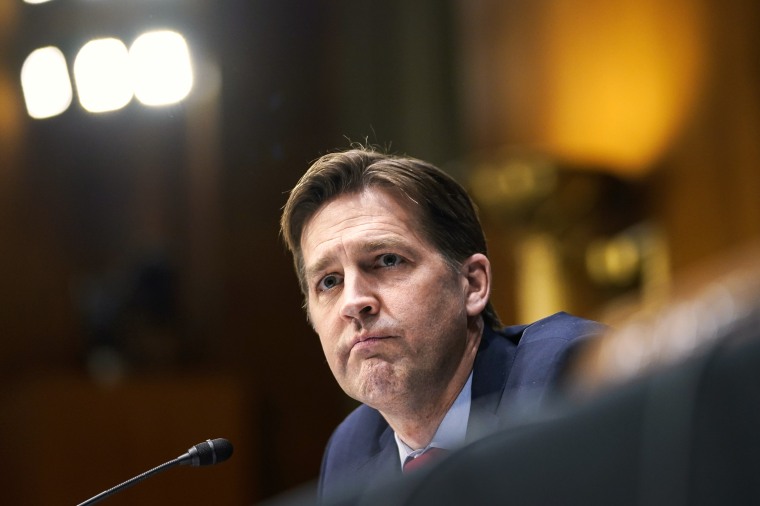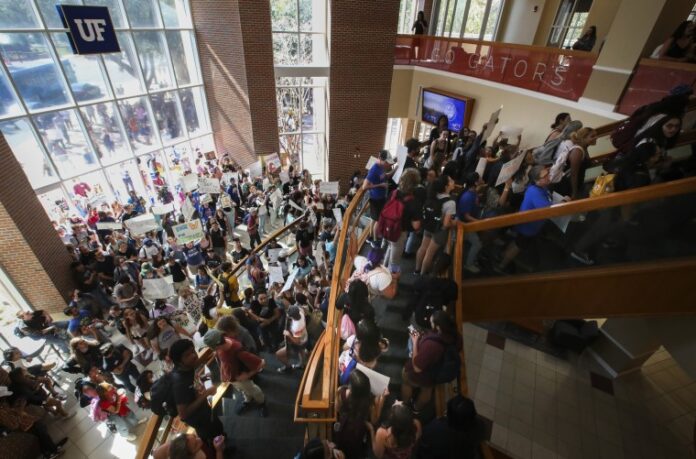Hundreds of University of Florida students held protests this week criticizing the anticipated appointment of Sen. Ben Sasse, R-Neb., to lead the school.
A presidential search committee unanimously approved Sasse last week as its sole finalist for the top job. Prior to his election to the U.S. Senate in 2015, Sasse had led a small private Lutheran college in Nebraska for several years.
Much of the outrage Monday was colored by student opposition to his past stances on LGBTQ rights, such as his objection in 2015 to the Supreme Court’s legalization of same-sex marriage in the landmark case Obergefell v. Hodges — he called it a “disappointment” — and his continued assertion that the “sanctity of marriage” is one of his top priorities in Congress.
A crowd the Gainesville Sun estimated at about 1,000 people, including students and staff, stormed a building Monday in which Sasse, who is expected to resign from the Senate before the end of the year, was holding a series of planned town halls.
The protest against his appointment is the latest development at the intersection of LGBTQ rights and an increasingly politicized public education landscape in Florida, a state that has long been seen as a sort of ground zero in the fight for LGBTQ equality in the United States.

Sasse has said that as university president, he would do his best to represent the views of lesbian, gay, bisexual, transgender and queer students. But for some, his candidacy has called to mind the university’s anti-LGBTQ history and the extent to which many of them feel it continues to sideline their needs and experiences, four LGBTQ students told NBC News.
“To think that the leader of our school is going to be someone who doesn’t reflect our values is devastating,” RJ Della Salle, a freshman who is gay, said.
Della Salle was one of the students who attended the protests, which disrupted the question-and-answer sessions Sasse was holding as he struggled to make himself heard over shouts of “Hey, hey, ho, ho, Ben Sasse has got to go!” Sasse said at the forum that he “intellectually and constitutionally welcomed” the demonstrators.
While Sasse was speaking, Della Salle was outside while his boyfriend, Evan Smith, was inside the room, where the protests grew so disruptive that people said they felt the walls shaking.
“They were banging on the door and the railings and the walls,” Smith said. “We felt the whole thing shaking.”
Sasse left without engaging the protesters. During the forums, however, he addressed a number of questions on his past political stances and attempted to suggest that he could still represent the views of the nearly 60,000 students and thousands more staff at the University of Florida, one of the largest schools in the state, even if they conflict with the positions he has held as a politician for the people of Nebraska.

“Do I support and affirm everybody in this community?” Sasse said when asked about his support for the LGBTQ community. “Absolutely.”
In July, Sasse told NBC News he believed the Respect for Marriage Act, which would codify the right to same-sex marriage into federal law in the wake of the reversal of Roe v. Wade, was an attempt by House Speaker Nancy Pelosi, D-Calif., to “divide America with culture wars.”
On same-sex marriage, Sasse acknowledged Monday that he has in the past had “disputes” about which decisions should be made by courts versus state legislatures, but he called Obergefell the “law of the land” and said “nothing about Obergefell is changing in the United States.”
A university spokesperson declined to comment further. In the announcement last week of Sasse’s selection as the sole finalist, Rahul Patel, chair of the presidential search committee and a university trustee appointed by Gov. Ron DeSantis, a Republican, called Sasse “right for the University of Florida” and “right for the state of Florida.”
“Ben brings intellectual curiosity, a belief in the power and potential of American universities, and an unmatched track record of leadership spanning higher education, government and the private sector,” Patel said in a public statement.
Smith, a 20-year-old political science and history major, called Sasse’s expected appointment “really scary.”
“While the president of the university isn’t going to decide things like gay marriage or other things like that, his main job is representing the university,” Smith said. “It’s much more the symbolic representation, that he doesn’t represent the student body and the diverse faculty.”
A school president potentially motivated by political decision-making is a cause for concern, according to Lisa Scott, a psychology professor. On top of her day-to-day work for the university, Scott also has a third grader in an elementary school run by the university. Among other concerns, she said, she wonders whether Sasse’s interpretation of the state’s Parental Rights in Education Act, which critics have dubbed the “Don’t Say Gay” law, could have an impact on both her child’s school and the university’s school of education, which trains future educators.
“He has a history of voting against lots of aspects of people’s right to exist,” Scott said. “I think that’s very problematic to have all of that impacting how he makes university decisions.”
The appointment seems to have inflamed a broader sense of exclusion felt by LGBTQ students at the university, according to Alex Noon, the president of OUTLaw, the unaffiliated LGBTQ organization for the law school.
In March, for example, a founder of Liberty Counsel, an evangelical Christian legal organization that has been designated an anti-LGBTQ hate group by the Southern Poverty Law Center, was invited to speak at one of his courses, emails shared with NBC News show. After pushback, students were given the option to not attend class the day the guest speaker, Matt Staver, was invited to attend, though one of the course’s instructors in an email defended the educational value of hearing a talk by Staver, who has argued in front of the Supreme Court.
“We have to be super proactive for anything related to queer students, because they just don’t think about it,” Noon said.
That sentiment dates all the way back to the mid-1950s and 60s and the Johns Committee, a group formed by the state Legislature and supported by the university’s president with the express purpose of targeting and rooting out gay members of the university. Over a period of about a decade, the committee forced approximately 50 students and more than a dozen faculty members off campus, according to the campus newspaper, the Independent Florida Alligator.
The effort had a chilling effect that kept LGBTQ members of the University of Florida mostly silent about their identities until the 1980s, according to the university’s website. Since then, an LGBTQ advisory committee has made considerable ground in its fight for queer rights and representation on campus. In 2003, for example, the university’s nondiscrimination policy was updated to prohibit discrimination on the basis of sexual orientation, and again amended in 2011 to include gender identity and expression. More recent wins from the committee have come in the form of more gender-neutral bathrooms and inclusion training for faculty and staff.
Damon Veras, a 21-year-old senior who is gay and a member of the committee, said there’s still room for improvement. The university’s LGBTQ+ Affairs office, for example, has a high staff turnover rate, he said.
He said a “silver lining” of the protests was that many LGBTQ students made their concerns more widely known. But he said the politicization of the university’s leadership won’t change anytime soon.
“The next step is just continue to bring issues like this to the new president’s attention,” he said, “and make clear to him that queer and trans folks exist.”







